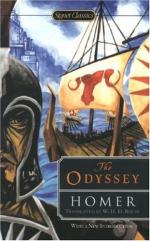But Theoclymenus said, “Eurymachus, you need not send any one with me. I have eyes, ears, and a pair of feet of my own, to say nothing of an understanding mind. I will take these out of the house with me, for I see mischief overhanging you, from which not one of you men who are insulting people and plotting ill deeds in the house of Ulysses will be able to escape.”
He left the house as he spoke, and went back to Piraeus who gave him welcome, but the suitors kept looking at one another and provoking Telemachus by laughing at the strangers. One insolent fellow said to him, “Telemachus, you are not happy in your guests; first you have this importunate tramp, who comes begging bread and wine and has no skill for work or for hard fighting, but is perfectly useless, and now here is another fellow who is setting himself up as a prophet. Let me persuade you, for it will be much better to put them on board ship and send them off to the Sicels to sell for what they will bring.”
Telemachus gave him no heed, but sate silently watching his father, expecting every moment that he would begin his attack upon the suitors.
Meanwhile the daughter of Icarius, wise Penelope, had had a rich seat placed for her facing the court and cloisters, so that she could hear what every one was saying. The dinner indeed had been prepared amid much merriment; it had been both good and abundant, for they had sacrificed many victims; but the supper was yet to come, and nothing can be conceived more gruesome than the meal which a goddess and a brave man were soon to lay before them—for they had brought their doom upon themselves.
Book XXI
The trial of the axes, during which Ulysses reveals himself to Eumaeus and Philoetius
Minerva now put it in Penelope’s mind to make the suitors try their skill with the bow and with the iron axes, in contest among themselves, as a means of bringing about their destruction. She went upstairs and got the store-room key, which was made of bronze and had a handle of ivory; she then went with her maidens into the store-room at the end of the house, where her husband’s treasures of gold, bronze, and wrought iron were kept, and where was also his bow, and the quiver full of deadly arrows that had been given him by a friend whom he had met in Lacedaemon—Iphitus the son of Eurytus. The two fell in with one another in Messene at the house of Ortilochus, where Ulysses was staying in order to recover a debt that was owing from the whole people; for the Messenians had carried off three hundred sheep from Ithaca, and had sailed away with them and with their shepherds. In quest of these Ulysses took a long journey while still quite young, for his father and the other chieftains sent him on a mission to recover them. Iphitus had gone there also to




